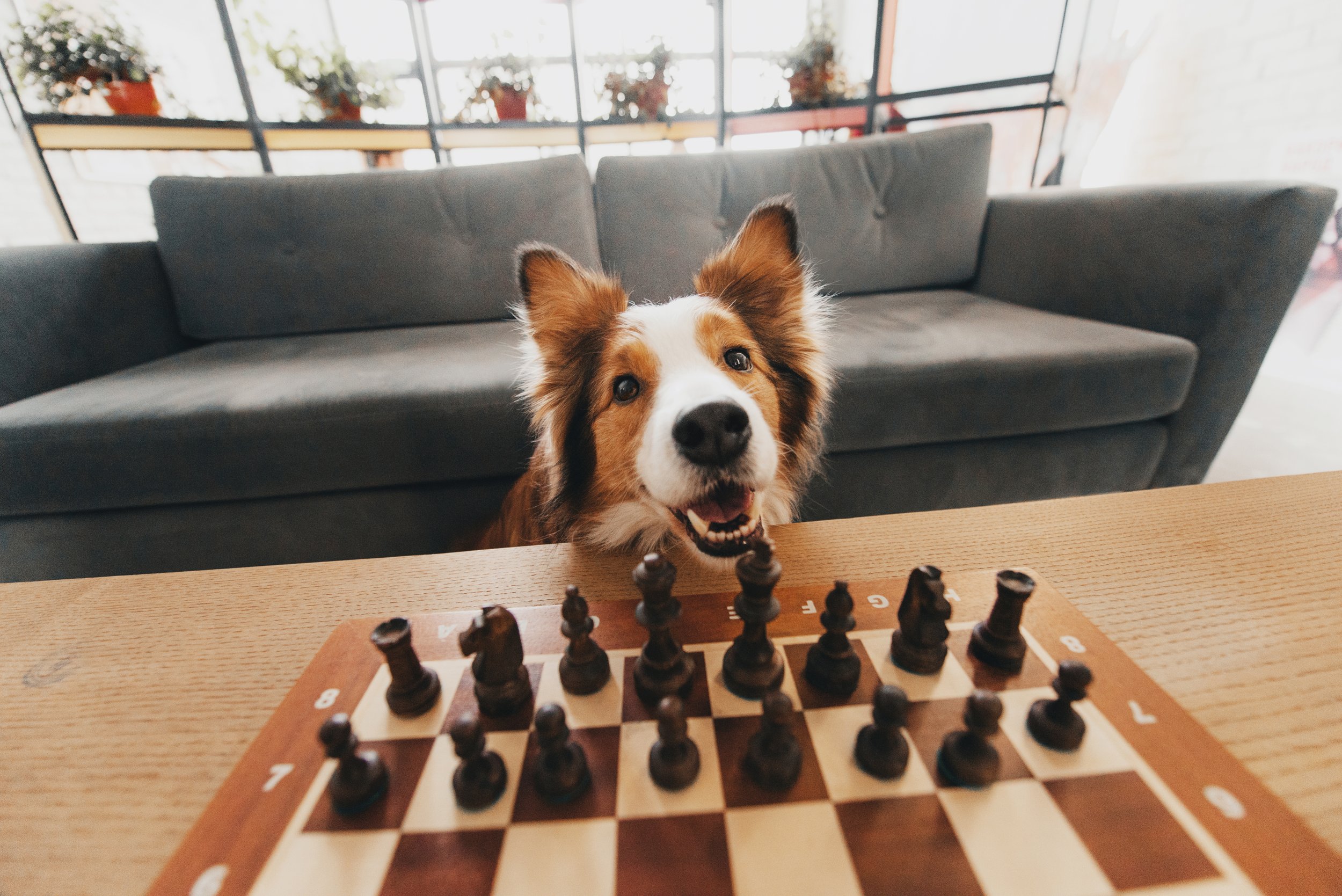Healthy Ways to Train Your Dog’s Brain
Brain Training is Not Just for Humans
On October 13, we celebrate National Train Your Brain Day, which promotes the idea that mental exercise is just as important as physical exercise. Have you ever heard the phrase “use it or lose it?” This rings true for our mental acuity just as much as our physical bodies: it’s been proven that our cognitive function is significantly reduced when we don’t challenge our brains on a regular basis. But did you know that brain training is just as important for dogs as it is for humans?
Mental exercises are often overlooked but incredibly important for your dog’s overall wellbeing. Enrichment activities that encourage your dog to develop problem solving and investigation skills can help prevent inappropriate behaviors, strengthen your bond, and just plain tire them out!
So how exactly do you help your dog exercise their brain? If you’ve never tried before, you may be envisioning a dog college, or at the very least, an incredibly complicated tutoring program. Luckily, many brain training exercises for dogs involve simple sessions that you can set up with objects you already have at your home.
Brain Training for Dogs at Home
Minimal equipment is needed for these fun, at-home training games.
Hide Toys and Treats
Your dog is a natural-born finder. With his incredibly powerful sense of smell, your dog loves the challenge of finding and unearthing treasures. If you don’t want to make a mess by digging up holes in your backyard, you can hide your dog’s favorite toy or a couple of treats around your home. Simply put your dog in a “stay” position and let them watch you bury their squeaky toy between the couch cushions or underneath the coffee table. When you’re done, release them from their “stay” and encourage them to go find the object. After a few rounds of this, you and your dog will be having a great time together!
Make a Dig Pit or a Snuffle Mat
Some dogs just love to dig. This hearkens back to that natural finding ability they carry with them throughout their lives. You can indulge this activity while keeping your flower beds safe by making an in-house dig pit. To do so, simply find a shallow box that’s an appropriate size to accommodate your dog and fill it with soft materials like cut up rags, toilet paper rolls, and other dog-safe items. Hide a treat or two beneath the layers and watch your dog go nuts! You can also use a snuffle mat, which is a mat made of several layers of rug or cloth with several pockets for treats or bits of kibble. These activities are safe and relatively mess-free!
Teach a New Trick
You absolutely can teach an old dog new tricks with patience and preparation! Learning a new trick is the quintessential way to train your dog’s brain, and it can lead to better communication and understanding between you and your dog. Whatever trick you decide to learn, be sure to have plenty of high-value treats on hand to reward good behavior. Also, keep your training session relatively short; spending too much time may cause your dog to become bored and lead to some frustration for everyone involved.
Try a Puzzle Toy
Many innovative and exciting types of puzzle toys have appeared on the pet care scene, especially in recent years. Ranging from simple action-reward toys to more complicated, multi-step challenges, puzzle toys for dogs are readily available at most pet stores and can be fairly affordable based on complexity. Generally speaking, all you need to do is pop a few treats in the proper receptacles and encourage your dog to explore on their own! Even a Kong stuffed with kibble and treats can serve as a simple mental stimulator for your pup.
Brain Training for Dogs Outside
Looking for some brain training opportunities while you’re out and about? These activities are simple and effective.
Socialize Your Dog
Socialization is an incredibly important step in your dog’s upbringing, and it’s also a simple and fun way to train their brain. Best practices for socialization vary greatly based on your dog’s age and stage of development. While puppies and adolescent dogs may be comfortable learning by experience and encountering many new dogs and people at once, adult dogs need a much gentler approach as they may become overwhelmed by unfamiliar situations. Ask your veterinarian for some tips on the best ways to socialize your dog at their current age. No matter which methods you choose, always be sure your dog is in a safe play environment and can exit when they’re done with the activity.
Mix Up Your Walking Paths
Do you and your dog take the same walking route every day? They may be getting bored of seeing the same landmarks and experiences every time. Simply changing up your walking route is a great way to stimulate your dog’s brain and body at the same time. Aim to take your dog through a wide variety of environments, from your neighborhood sidewalks to dirt roads and even forest trails. We bet your dog will be ready for a nice long nap once you make it back home!
A Healthy Diet Supports a Healthy Brain
A healthy diet can give your dog the energy they need to carry out any brain training challenges you put in front of them. In honor of National Train Your Brain Day, make a commitment to giving your dog mental exercises 3-5 times a week. With so many simple and affordable options available for brain training, there’s no reason not to! As we mentioned above, short sessions are typically preferable to help avoid burnout and exhaustion. Finally, always have some healthy, tasty treats at the ready to reward great behavior. Head over to our online store or meet us at a weekend farmers market to stock up on your dog’s new favorite treats.

